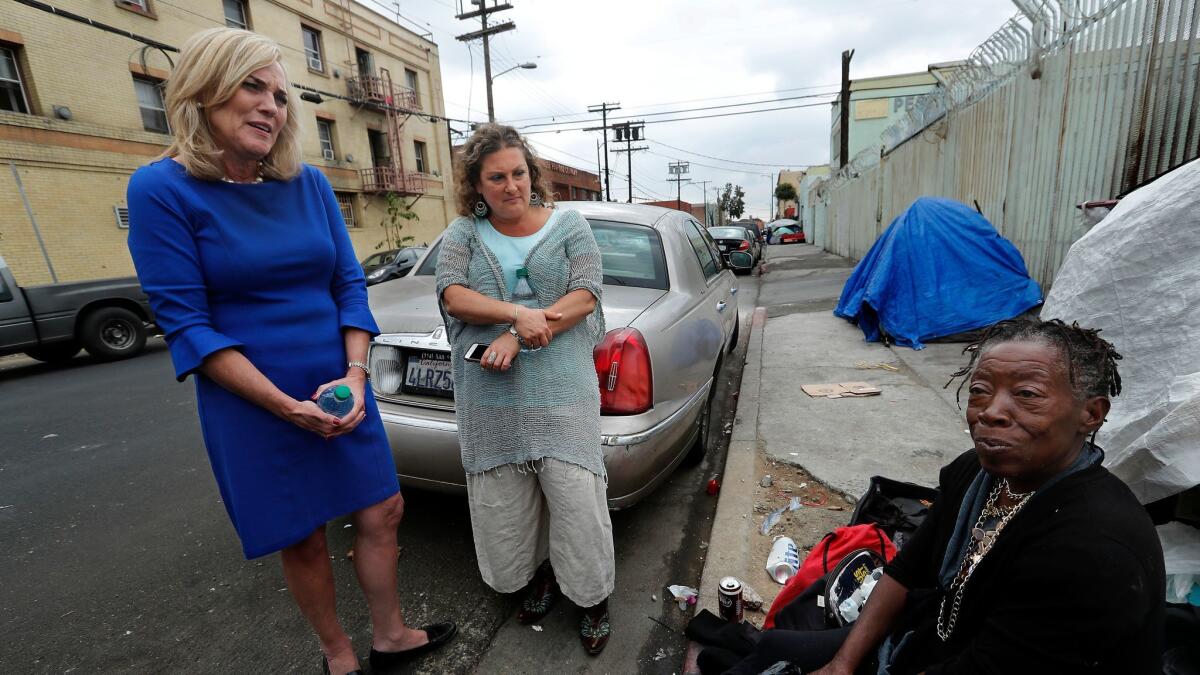L.A. County urges state to expand definition of ‘gravely disabled’

The Los Angeles County Board of Supervisors approved a motion Tuesday that asks California lawmakers to change the way the state defines “grave disability” in order to give officials more power to forcibly treat mentally ill homeless people.
The motion comes amid concern about the growing number of deaths of the homeless in L.A. County. According to data from the Los Angeles County coroner’s office, 831 homeless people died in 2017, compared with 458 in 2013.
A county Department of Mental Health report said that a “significant number” of those deaths are believed to have been caused by preventable medical conditions.
Under the Lanterman-Petris-Short Act, passed in 1967, police are allowed to take a person into custody for psychiatric treatment if mental illness prevents them from meeting their basic needs, such as food, clothing or shelter.
Tuesday’s motion seeks to get the state to pass legislation that broadens that definition to include people who are unable to seek medical care because of their mental illness.
Broadening the “gravely disabled” law would allow officials to put mentally ill homeless people on involuntary psychiatric holds if a court determines that because of a person’s mental illness, he or she is not able to seek medical care.
Backers argue that changing the law would help homeless people whose mental illness prevents them from recognizing when they need medical attention.
Opponents say that forcibly treating someone could infringe on their civil rights.
The motion passed 4 to 1.
Some Los Angeles city officials are expected to follow suit. Councilman Jose Huizar said in a tweet Tuesday that the City Council will introduce a resolution Wednesday to support the county effort.
Supervisor Kathryn Barger, who co-sponsored Tuesday’s motion with Mark Ridley-Thomas, said she was motivated to change the law after spending time on skid row.
“The goal is to get people healthcare. We have to do better.” Barger said. “The individuals you see on the street for the most part are those who have a grave disability.”
Facing a Feb. 16 deadline to introduce legislation for 2018, Erick Matos, Barger’s health deputy, said the office is working to identify an Assembly member who would carry the legislation.
In the 1980s and ’90s, there were several unsuccessful attempts to amend the law.
About 16,000 homeless people in the county suffer from a “serious mental illness,” according to the Los Angeles Homeless Services Authority.
Supervisor Sheila Kuehl, who cast the lone dissenting vote, said she is concerned that forcing people into treatment could cause more harm than good.
“You’ll have a 72-hour hold in a hospital and then what? Who is going to take care of [their] pets? Who is going to watch [their] stuff,” Kuehl asked during the meeting.
More than a dozen people, including relatives of mentally ill homeless people, public health experts and advocacy groups, gave emotional remarks both supporting and opposing the motion.
Sandy Carlson, whose son is homeless and suffers from schizophrenia, spoke in favor. She said that because of the current law, officials aren’t able to place her son on involuntary psychiatric holds.
“Maybe my son will be able to have his life saved,” Carlson told the supervisors as she fought back tears. “He has a lack of insight, which is why he refuses treatment. He doesn’t know any better.”
Times staff writers Dakota Smith and Soumya Karlamangla contributed to this report.
Twitter: @melissaetehad
More to Read
Sign up for Essential California
The most important California stories and recommendations in your inbox every morning.
You may occasionally receive promotional content from the Los Angeles Times.











